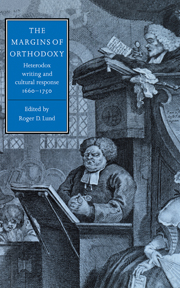Book contents
- Frontmatter
- Contents
- List of contributors
- Acknowledgments
- Introduction
- PART I THE IDEOLOGY AND ORIGINS OF HETERODOXY
- 1 Within the margins: the definitions of orthodoxy
- 2 Freethinking and libertinism: the legacy of the English Revolution
- PART II LOCKE AND HETERODOX OPINION
- PART III POLICING THE MARGINS
- PART IV ORTHODOX DEFENSES, HETERODOX RESULTS
- Select bibliography
- Index
2 - Freethinking and libertinism: the legacy of the English Revolution
Published online by Cambridge University Press: 09 October 2009
- Frontmatter
- Contents
- List of contributors
- Acknowledgments
- Introduction
- PART I THE IDEOLOGY AND ORIGINS OF HETERODOXY
- 1 Within the margins: the definitions of orthodoxy
- 2 Freethinking and libertinism: the legacy of the English Revolution
- PART II LOCKE AND HETERODOX OPINION
- PART III POLICING THE MARGINS
- PART IV ORTHODOX DEFENSES, HETERODOX RESULTS
- Select bibliography
- Index
Summary
Eighteenth-century infidelity – skeptical libertinism – goes back to what used to be called “the Puritan Revolution.” Whether the one caused the other is a matter for discussion, but that eighteenth-century heterodoxy was anticipated during the English Revolution is easily demonstrated.
First we must recall the circumstances of that revolution. England before 1640 was a society that had never known freedom of discussion. There had been censorship ever since the coincidence in time of printing with the Protestant Reformation and the translation of the Bible into English. Censorship was not always effective, but it was there as a deterrent, and it was tightened up as revolution approached in the 1630s. All English men and women were deemed to be members of the state church, legally bound to attend services in their parish church every Sunday; it was a legal offence to attend “conventicles,” discussion groups not authorized by the national church.
Yet the Protestant Reformation and the availability of the Bible in English for an increasingly literate laity had intensified discussions over a whole range of subjects extending well beyond the narrowly theological. How should the church be governed? Should local congregations be subordinated to a national church? Was the English hierarchy of bishops, deans and chapters, and parish clergy authorized in the Bible? Why should all English men and women be legally compelled to pay tithes to a minister whom they had not chosen and whose personality or theology they might detest? Why might not congregations choose their own minister? Was the royal supremacy over the Church of England sanctioned in the Bible?
- Type
- Chapter
- Information
- The Margins of OrthodoxyHeterodox Writing and Cultural Response, 1660–1750, pp. 54 - 70Publisher: Cambridge University PressPrint publication year: 1995
- 4
- Cited by



